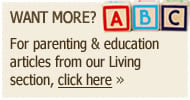Years ago, I forgot my baby’s diaper bag on a park bench in Jerusalem. By the time I remembered it and rushed back to the park, there was a policeman clearing the area and shouting over and over again: “Shel mi hatik hazeh? Af echad?” (“To whom does this bag belong? No one?”) I ran up to him, humiliated by my carelessness to the point that I almost didn’t want the diaper bag back. But I also didn’t want the police to have to blow up the bottles and sippy cups and Bamba within the suspicious bag.
“Sheli” (“It’s mine”), I almost whispered. The policeman looked like he wanted to throw the bag at me.
I was two blocks away from the Sbarro’s pizza shop when the bombing took place in 2001“What’s wrong with you? Americanim—you don’t think.” I rushed away from the scene, the diaper bag slung over my shoulder, and my face burning with shame. I hadn’t meant to forget the bag. Sometimes people make mistakes. Why did the policeman have to insult me? It seemed a little extreme to me at the time. Couldn’t he tell that the diaper bag with the Thomas the Train cup sticking out of the side wasn’t a bomb? Soon after that, the intifada began, and I began to understand.
I was two blocks away from the Sbarro’s pizza shop when the bombing took place in 2001, murdering 15 people and seriously injuring 130. I heard the explosion. To this day, I am grateful that I did not hear the screams that were muffled by the immediate sirens echoing through Jerusalem. The terror attack almost paralyzed me with fear for months afterwards. The enemy can be standing in line with me for pizza, I thought. He can be sitting next to me on a bus. Or standing beside me as I’m buying olives in the market.
Suddenly, it seemed like nowhere was safe.
At least I have a car, I thought—until a terrorist took a tractor and started bashing randomly into people’s cars. One morning I was driving up the highway to Jerusalem, and suddenly the car in front of me stopped short, and two guys in black suits with machine guns jumped out the back doors. They ran up to the car in the other lane, and literally jumped through the window to tackle what must have been a suspected terrorist, who was now lying face-down on the highway in front of my car. It seemed to me like everyone behind me and beside me was calm. I was petrified. What if the terrorist had a bomb on him? I was stuck, surrounded by cars. Should I get out of my car and run the other way? But before I could decide, the whole thing was over. The bomb squad had somehow, in a matter of seconds, jumped back into their vehicle with the suspect, and the morning rush hour proceeded as usual. But the fear became a constant companion for me, as I tried to figure out what it means to live “normally” under the constant threat of terror.
Fear became a constant companion for me, as I tried to figure out what it means to live “normally” under the constant threat of terrorI asked G‑d to show me what to do with all of this fear. I asked Him to help me live “normally” with it. And I realized that fear can be used for growth. Here are three fears that help us instead of stopping us in our tracks:
1. Fear of meaninglessness
I am afraid that I will wake up one day and have no idea what I accomplished with my life. I’m afraid that I’m using only a fraction of my potential. I’m afraid of wasting time. I’m afraid of a life without purpose. This fear helps me to value my time, and to focus on my life’s goals.
2. Fear of Dying
I’m afraid that I will run out of time. I’m afraid because I don’t know how or when my time will run out. This fear may seem debilitating, but it actually enhances life. It reminds me not to get stuck in the irrelevant, little things that seem so important. There is a time limit, and I don’t know what it is. So, I’m not going to fight or dwell or feel resentful about petty things. It’s not worth it.
3. Fear of G‑d
One of the main obligations in Judaism is to fear G‑d. I never really understood what that meant, until I learned the camera metaphor. Imagine that there is a hidden camera following you everywhere, recording everything you do and say. You will speak differently. You will act differently. This is what it means to be aware of G‑d and to fear him. I know He is watching me. I know He expects more of me. This fear can help me to achieve greatness, as I think of the hidden recordings in my life. Once the image is there, it cannot be deleted.
I did eventually go back to “regular” routine, the way all Israelis miraculously do. I brought my kids to school. I worked. I did the grocery shopping. But the strength of the fear itself was never far below the surface.
We need to know what to cry for. We need to know how to cry for each otherWe are living in America now, and now I am afraid for Israel from afar. I pray for the safety of all there, and for the immediate recovery of those who have been injured. Not long ago I was in a Torah class, and the teacher began to speak about what we can learn from tragedy. But after a few seconds, she just broke down crying, and we all cried with her. And I learned then, as I try to remind myself now: We need to know what to cry for. We need to know how to cry for each other. And we need to know what to fear, and how to turn our fears into paths to greatness.







Join the Discussion